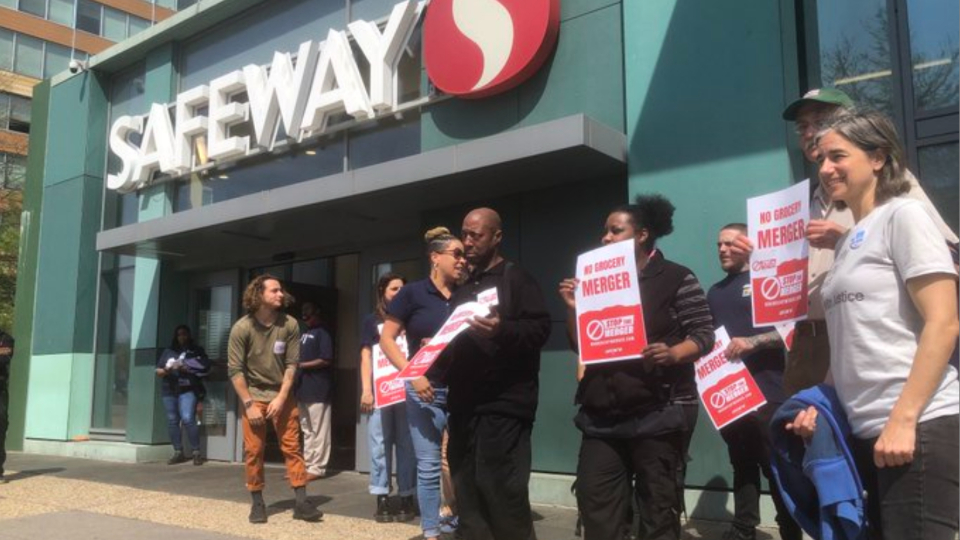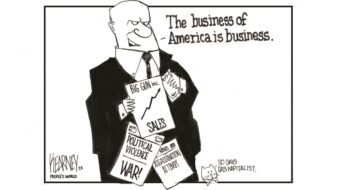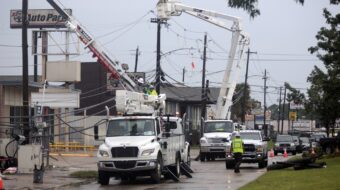
WASHINGTON (PAI)—Members of United Food and Commercial Workers Local 400 and their allies took to informational picket lines in metro D.C. on April 5 in a campaign to save local supermarkets—and jobs—from a mega-merger threat which could also raise prices for consumers. Lines went up at three stores.
Their goal, shared by their parent union: To build community support to convince the Federal Trade Commission to veto the proposed multi-billion-dollar combination of the Safeway chain, owned by Albertson’s, with Kroger.
The combo “is a looming disaster for everyone who buys groceries in America,” says the local, which organized three area protests that day alone. The Teamsters, who represent drivers for both chains, are also leery of the mega-merger.
“I come out of Local 400,” said Metro D.C. Central Labor Council President Dyana Forester, who joined two dozen protesters outside the Safeway in Southwest D.C., just blocks from Nationals Park. That store was her local grocery when she was growing up.
“We want to make sure we have the community behind us, and let them know how the merger would impact the community and the jobs.”
The rampant fear among both the Local 400 workers and other Safeway workers nationwide is that if the merger goes through, dozens of stores will be arbitrarily closed and thousands of jobs will be lost. To add insult to that injury, prices will rise for shoppers because competition for their business will decline, said Aretha Green of Local 400.
The Safeway store where they leafleted and talked with shoppers, for example, could close or see its hours cut. The Southwest Safeway, a neighborhood fixture for decades—preceding the urban renewal and gentrification the ballpark brought—is within a mile and a half of a Harris Teeter, which would also be part of the merger.
“We are on the verge of losing our store. We feel it coming,” Green said. “And our workers are going to lose their jobs. All of our stores will be at risk,” she said of the Safeways in metro D.C.
UFCW, speaking for workers it represents in both merger partners, told senators last year of the mega-merger’s threat to jobs nationally. Green estimated the total job loss in the D.C. metro area alone could exceed 10,000. Most of the threatened grocery workers are people of color.

“Kroger and Albertsons executives must provide the answers and information needed to address the serious concerns our members and the American people have about this proposed merger,” union President Marc Perrone said last year. “Doing so is the only way to determine the path forward that will safeguard America’s essential grocery workers and the American families who rely on these incredibly hardworking men and women.”
The Southwest Safeway protest wound up with two chants: “Kroger-Safeway, you’re no good!
Don’t merge in our neighborhood!” and “Kroger-Safeway, can’t you see? We don’t like monopoly!”
Teamsters President Sean O’Brien also spoke up last October, when Kroger and Safeway/ Albertson’s announced their plans. He calculated 18,000 Teamster member-workers, for both chains, are at risk. They include warehouse workers and truckers.
The union “will oppose any merger that threatens jobs or weakens working conditions,” O’Brien declared then.
“Historically, mergers of this magnitude have a negative impact on workers and the public. Less competition almost always means higher prices and fewer choices.”
Given that “Teamster warehouse jobs in the grocery industry are some of the best jobs in the country,” and the “serious implications” for the workers, the mega-merger “is another example of why real antitrust reform is needed.”
O’Brien pledged to monitor what the FTC does about the deal, since the public, the workers, the union, the communities, elected officials, shareholders and consumer advocates are all concerned about the combination’s impact.
We hope you appreciated this article. Before you go, please support great working-class and pro-people journalism by donating to People’s World.
We are not neutral. Our mission is to be a voice for truth, democracy, the environment, and socialism. We believe in people before profits. So, we take sides. Yours!
We are part of the pro-democracy media contesting the vast right-wing media propaganda ecosystem brainwashing tens of millions and putting democracy at risk.
Our journalism is free of corporate influence and paywalls because we are totally reader supported. At People’s World, we believe news and information should be free and accessible to all.
But we need your help. It takes money—a lot of it—to produce and cover unique stories you see in our pages. Only you, our readers and supporters, make this possible. If you enjoy reading People’s World and the stories we bring you, support our work by donating or becoming a monthly sustainer today.












Comments